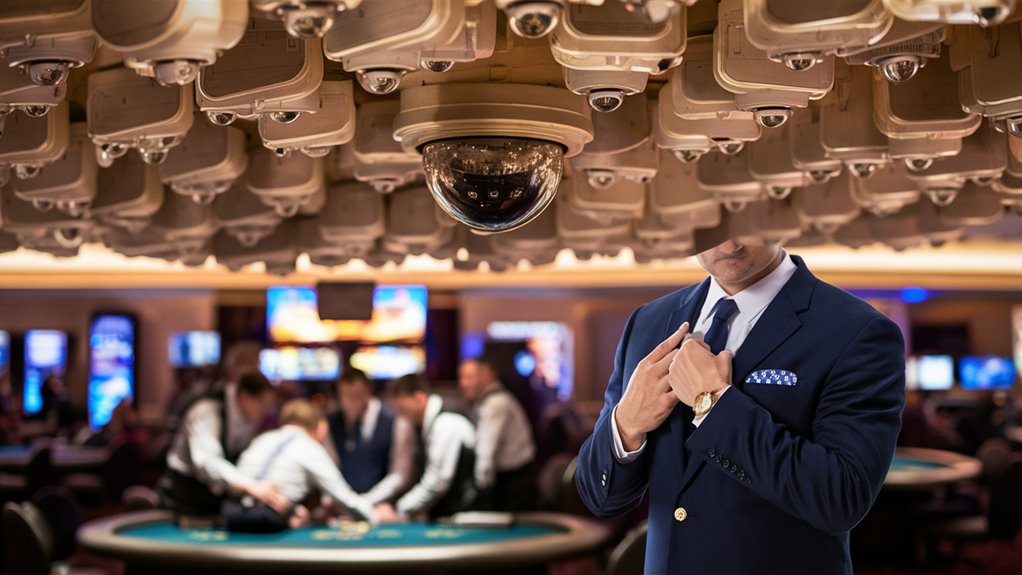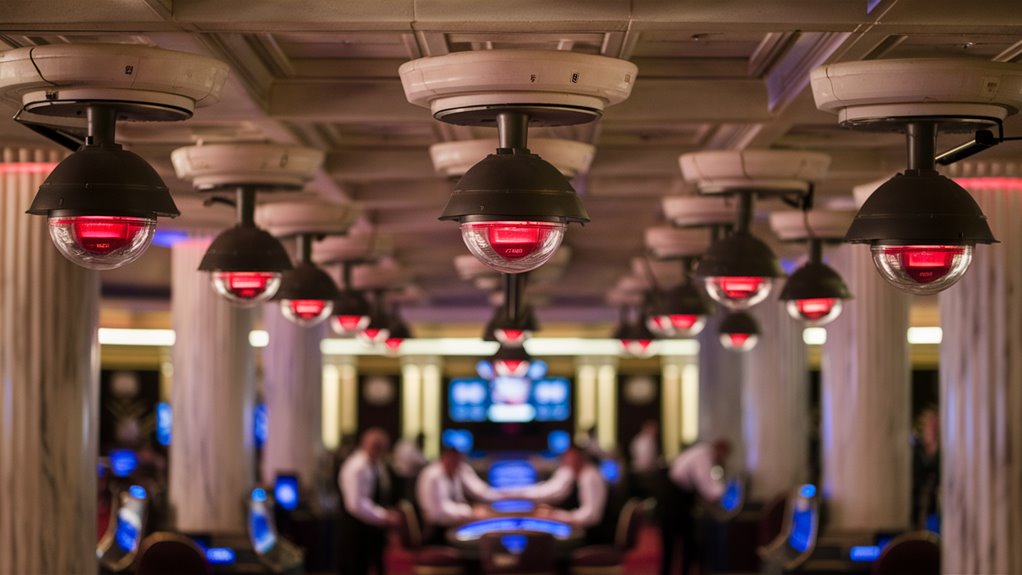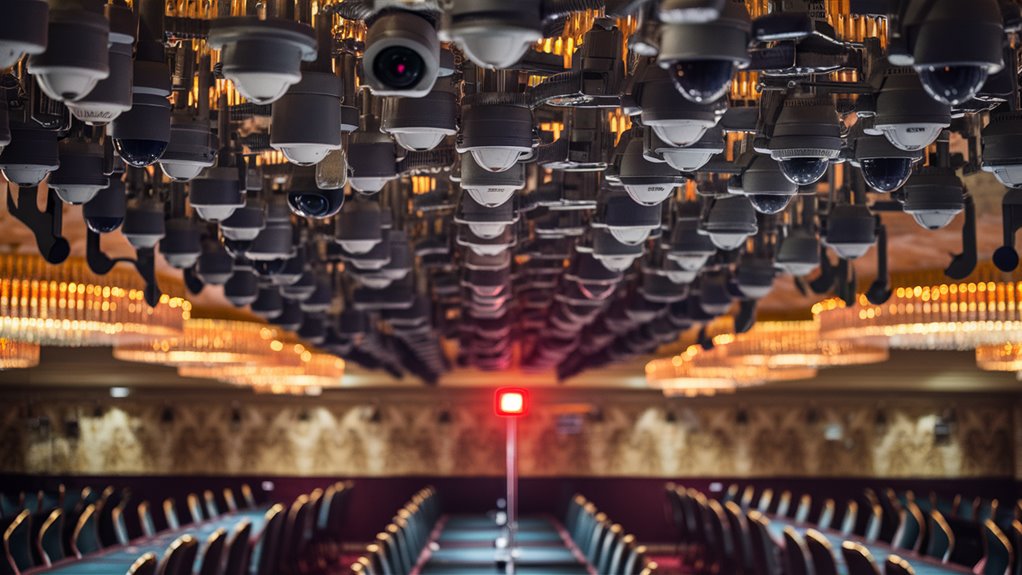
The Vegas Casino That Faced Legal Action for Its Intrusive Player Surveillance Practices
Vegas Casino Surveillance Controversy: Legal Battle Over Player Privacy
Landmark Privacy Case Rocks Gaming Industry
A prominent Las Vegas casino operator faced intense legal scrutiny in 2021 over controversial surveillance practices that secretly collected player data. The casino's sophisticated AI-powered monitoring system deployed extensive facial recognition technology and RFID tracking to gather biometric information without proper player consent.
Privacy Violations and Legal Consequences
The unauthorized surveillance system directly violated Nevada Gaming Law NRS 463.670, which mandates transparent disclosure of monitoring protocols. This breach sparked multiple class-action lawsuits from affected players and triggered regulatory investigations into the casino's practices.
Advanced Surveillance Technologies Under Fire
The controversial system incorporated:
- Facial recognition cameras
- RFID chip tracking
- Behavioral analytics software
- Biometric data collection
Industry-Wide Impact and Reform
The legal challenge resulted in a comprehensive overhaul of the casino's surveillance infrastructure and established new privacy protection standards across the gaming industry. This watershed case fundamentally transformed how casinos balance essential security measures with crucial player privacy rights.
Enhanced Privacy Protocols
The resolution implemented strict requirements for:
- Player consent procedures
- Data collection transparency
- Surveillance disclosure policies
- Privacy protection measures
The case serves as a defining moment in gaming surveillance regulation, creating lasting impacts on casino security practices and player privacy protection standards.
The Rise of Automated Surveillance

The Evolution of Automated Casino Surveillance Systems
Advanced Monitoring Technologies Transform Gaming Security
Modern casino surveillance systems have undergone a revolutionary transformation, with automated technologies replacing traditional manual monitoring across Las Vegas gaming establishments.
Facial recognition software, RFID tracking, and AI-powered analytics now serve as the cornerstone of contemporary casino security operations, enabling unprecedented monitoring precision.
Real-Time Analytics and Pattern Detection
Advanced surveillance platforms now simultaneously monitor thousands of gaming positions through sophisticated automation.
These integrated security systems instantly detect suspicious activities through real-time analysis of betting patterns, player behaviors, and table game irregularities.
The comprehensive data infrastructure maintains extensive databases of transactions and surveillance footage, creating interconnected security networks across multiple casino properties.
Artificial Intelligence and Predictive Security
Machine learning algorithms have fundamentally transformed player tracking capabilities in modern gaming establishments.
These sophisticated systems can identify potential advantage players, card counters, and organized cheating operations before any suspicious activity occurs.
While this technological integration has significantly enhanced casino security protocols, it has also sparked important discussions regarding patron privacy and data protection standards in gaming environments.
Key Security Features:
- 24/7 automated monitoring
- Real-time pattern analysis
- Multi-property security integration
- Predictive behavior detection
- Advanced data storage systems
Players Fight Back

Casino Players' Counter-Surveillance Tactics
Privacy Protection Methods
Casino patrons are increasingly adopting sophisticated counter-surveillance measures to safeguard their privacy against automated monitoring systems.
Privacy-enhancing technologies include specialized eyewear designed to thwart facial recognition algorithms and strategic clothing choices that disrupt behavioral analysis systems.
Legal Challenges and Player Rights
Class-action lawsuits challenging casino surveillance practices have emerged nationwide, focusing on biometric data collection and personal tracking concerns.
These legal battles center on fundamental questions of consent and reasonable privacy expectations within gaming establishments. Players are demanding greater transparency regarding data collection policies and usage protocols.
Counter-Surveillance Technology Market
The growing demand for privacy has spawned a robust market for anti-surveillance equipment specifically engineered for casino environments. Key innovations include:
- RF-blocking wallets preventing unauthorized player card tracking
- Privacy consultation services specializing in digital footprint management
- Anti-tracking accessories designed for casino environments
Privacy Advocacy Movement
Player advocacy groups have mobilized to influence surveillance regulations in the gaming industry. Their primary objectives include:
- Mandatory disclosure of data collection methods
- Restrictions on biometric information storage
- Enhanced player privacy protections
- Transparent reporting of surveillance practices
This ongoing tension between casino security requirements and player privacy rights continues to transform surveillance practices throughout the gaming industry.
Behind The Monitoring System

Behind Casino Surveillance: Advanced Monitoring Systems
Integrated Surveillance Technologies
Modern casino surveillance systems deploy multi-layered security infrastructure that seamlessly integrates cutting-edge monitoring technologies.
The comprehensive system combines high-definition surveillance cameras, sophisticated facial recognition software, and artificial intelligence algorithms to maintain complete oversight of gaming operations.
Advanced Camera Networks
The foundation of casino monitoring relies on an extensive network of HD surveillance cameras equipped with precision zoom capabilities. These systems deliver:
- Real-time monitoring of gaming tables and slots
- Crystal-clear footage of chips and card movements
- Pan-tilt-zoom functionality for dynamic observation
- Multi-screen surveillance coverage
AI-Powered Detection Systems
Artificial intelligence monitoring revolutionizes casino security through:
- Pattern recognition algorithms for detecting suspicious betting
- Automated behavior analysis of player activities
- Real-time alert systems for potential card counting
- Predictive analytics for risk assessment
Biometric Security Integration
The implementation of advanced facial recognition technology creates a robust security framework by:
- Database matching against known advantage players
- Player profiling through integrated tracking systems
- Movement pattern analysis across gaming areas
- Win/loss behavior monitoring
Secure Data Infrastructure
Casino surveillance maintains integrity through:
- Encrypted network protocols
- Secure data transmission
- Protected access controls
- Real-time backup systems
This comprehensive monitoring framework ensures maximum security while maintaining operational efficiency across the gaming floor.
Legal Battle Unfolds

Legal Battle Over Casino Surveillance Privacy Rights Intensifies
Advanced Gaming Surveillance Sparks Privacy Debate
Recent legal challenges surrounding casino surveillance technology have triggered unprecedented debates over privacy rights and gaming oversight.
Several high-profile cases in Las Vegas have brought scrutiny to casinos' implementation of facial recognition systems and biometric data collection without explicit patron notification.
Legal Framework and Compliance Challenges
The cornerstone of these disputes centers on Nevada's privacy statutes, particularly NRS 463.670, which mandates clear disclosure of surveillance practices.
A groundbreaking class-action lawsuit has emerged, challenging the deployment of AI-powered tracking systems without proper patron notification.
Casino Defense and Legal Arguments
Primary Defense Strategy
The casino industry's defense rests on established security protocols and implied consent principles. Gaming establishments maintain that:
- Surveillance measures align with standard industry practices
- Player entry into gaming areas constitutes implicit consent to monitoring
Legal Precedent Challenges
Plaintiff arguments have successfully demonstrated that modern surveillance technologies exceed the scope of traditional security measures outlined in existing regulations.
Regulatory Evolution and Future Implications
The Nevada Gaming Control Board has initiated comprehensive reform of surveillance guidelines.
New compliance requirements focus specifically on:
- Biometric data collection protocols
- Secure data storage standards
- Enhanced patron notification systems
These developments mark a critical shift in gaming industry regulations, balancing security needs with patron privacy rights.
Industry-Wide Privacy Implications

Industry-Wide Privacy Implications in Casino Surveillance
Transforming Casino Security Protocols
Privacy concerns stemming from Las Vegas casino surveillance practices have created significant ripples throughout the American gaming industry, compelling operators nationwide to fundamentally reconstruct their monitoring protocols.
Casino establishments across the country are implementing comprehensive updates to their privacy policies and surveillance procedures to mitigate potential legal challenges.
Evolution of Industry Standards
Gaming industry associations are spearheading the development of revolutionary guidelines governing facial recognition technology, player tracking systems, and data retention policies.
These frameworks establish critical boundaries between essential security requirements and fundamental guest privacy rights, creating a new paradigm for casino operations.
Regulatory Response and Compliance
The landmark case has triggered substantial changes in regulatory frameworks, with gaming commissions across multiple states initiating stricter oversight requirements for surveillance technologies.
New mandates emphasize enhanced transparency regarding casino practices for data collection, storage protocols, and utilization of customer information.
Strategic Balance for Future Success
Casino operators now face the complex challenge of maintaining equilibrium between three vital components:
- Robust security measures
- Enhanced player privacy protection
- Preservation of valuable analytics capabilities
The gaming industry's long-term viability hinges on achieving this delicate balance while adapting to increasingly stringent privacy regulations and evolving consumer expectations. This transformation marks a crucial turning point in how casinos approach surveillance and data management.
Reshaping Casino Security Standards

Modern Casino Security Standards: A Comprehensive Guide
Revolutionary Changes in Gaming Surveillance
Landmark security transformations have fundamentally reshaped surveillance requirements across Las Vegas establishments, following significant legal precedents.
These changes establish critical new frameworks balancing advanced security measures with essential privacy protections.
Core Security Requirements
Data Management Protocols
Casino surveillance systems must now operate under strict data retention policies, with specific limitations on footage storage duration.
Mandatory notice requirements ensure comprehensive visitor awareness of all monitoring activities, while explicit consent protocols govern specialized tracking implementations.
Biometric Security Framework
Standardized facial recognition protocols represent a cornerstone of modern casino security. Key requirements include:
- Encrypted biometric storage
- Restricted third-party data sharing
- Secure processing procedures
Compliance and Implementation
Player Protection Standards
The new security framework establishes unprecedented player safeguards through:
- Documented surveillance justification
- Independent oversight committees
- Regular compliance audits
Industry-Wide Impact
These binding security standards carry substantial penalties for non-compliance, extending influence beyond Las Vegas to reshape global gaming jurisdictions.
The comprehensive framework serves as a model for international casino security implementations.
